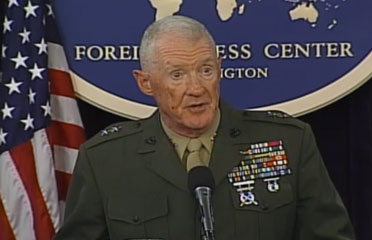
U.S. Marine Corps General Richard Mills, a former commander of coalition forces in south-west Afghanistan, praised Georgian troops serving in the coalition forces for “absolutely superb work.”
Speaking with journalists in Washington on April 27, Gen. Mills, who oversaw operations in the Afghan Helmand and Nimruz provinces from April 2010 until earlier this month, gave some details of assignments undertaken by the Georgian forces under his commend.
Two Georgian battalions – 31st and 32nd from the 3rd infantry brigade – were serving in Afghanistan under Mills’ command. Georgia started rotating its 32nd battalion with the 33rd battalion earlier this month.
“Each of them [31st and 32nd battalions] was magnificent unit. They were characterized by extraordinary professional performance,” Gen. Mills said after he was asked to comment on the Georgian troops’ performance in Afghanistan.
“They were so impressive in fact, that I assigned them a battle space of their own – a large area to west of Helmand province, where they operated in partnership with the Afghan forces to do full spectrum of operations near the city of Delaram [in Nimruz province],” he said.
“Georgians like to fight, they are professional soldiers, who understand what their tasks are and they are more than willing to carry them out. As a matter of fact they asked if they could be given even more duties and so one of their companies was sent to help out in place called Sangin … where a rather significant battle is being fought and again they did a magnificent job up there,” Gen. Mills said.
Sangin district in the Helmand province is regarded to be an important transit route for weapons, drugs and militants.
Gen. Mills said in Sangin the Georgian company was given “a tough” tasks against “a very determined enemy.”
“They [the Georgian unit] came out successful in every encounter; so I was extraordinary impressed,” he said.
He also said that as part of the assistance, the U.S. Marines provided the Georgian troops with “correct vehicles to resist mines.”
With the latest death reported on March 14, total number of Georgian soldiers killed in Afghanistan, since joining the NATO-led operation in November, 2009, increased to seven.
Georgia first deployed a company-sized unit in Afghanistan in November, 2009 and increased its contribution to the NATO-led forces to about 950 soldiers in April, 2010 after sending a battalion in Helmand. In February the Georgian Parliament approved government’s proposal to send to Afghanistan a team artillery instructors to train the Afghan military.

 RSS
RSS Mobile
Mobile Twitter
Twitter Facebook
Facebook